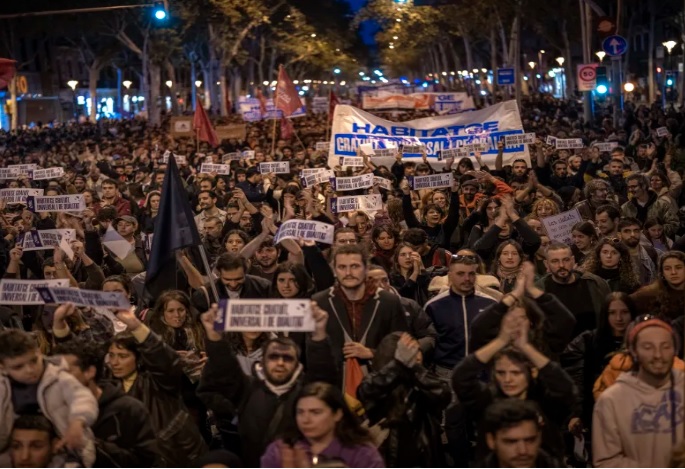Protesters disrupted traffic along the main thoroughfares in central Barcelona on Saturday, holding placards bearing slogans such as “Fewer apartments for investment and more homes for living” and “People without homes defend their rights.”
The lack of affordable housing has emerged as a significant issue in Spain, reflecting a broader global housing crisis, including in countries such as the United States. Organizers claimed that over 170,000 individuals participated in the protest, while local authorities estimated the crowd at approximately 22,000. Regardless of the exact numbers, the size of the demonstration evoked memories of the large-scale rallies that took place during the peak of the Catalan independence movement a decade ago. Today, however, concerns regarding housing have supplanted political movements as the dominant social issue.
Over the past ten years, the average rent in Spain has more than doubled. According to the well-known online property platform Idealista, the price per square meter has increased from 7.2 euros in 2014 to 13 euros in 2024, with cities such as Barcelona and Madrid experiencing even more pronounced rises. Meanwhile, wages have not kept pace, particularly among younger individuals in a country plagued by persistently high unemployment.
One protestor, who has resided in a central Barcelona apartment for the past 15 years, expressed his concerns to The Associated Press after being informed by his landlords that he must vacate the premises. He suspects that the owners intend to evict him in order to renovate the property, raise the rent, or convert it into a short-term rental. “Even if I search 20 or 30 kilometers outside the city, I cannot find anything within my budget,” he remarked. “I consider myself fortunate, as I earn a reasonable salary. Yet, even in my case, I may be forced to leave the city.”
A report by the Bank of Spain reveals that nearly 40% of Spaniards who rent spend, on average, 40% of their income on rent and utilities, compared to the European Union average of 27%. The rising cost of rent has thus become a pressing issue in Spain, where homeownership has traditionally been a key aspiration.
Furthermore, rental prices have been exacerbated by the demand from short-term renters, particularly tourists. Immigrants to Spain are also disproportionately affected by soaring rents, as they often lack sufficient savings to afford housing.
Spain’s public housing system is also notably underdeveloped, with less than 2% of available housing designated for public rental. This places Spain at the bottom of OECD rankings, where the average is 7%. By comparison, France allocates 14% of its housing stock for public rent, the United Kingdom 16%, and the Netherlands 34%.















